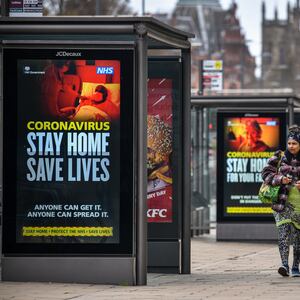The so-called Delta variant of the coronavirus, which was first detected in India and may carry double the risk of hospitalization compared to the Alpha—or U.K. strain—can cause unusual symptoms. Some people have reported hearing loss. Others, severe gastric distress. One Mumbai cardiologist reportedly treated two COVID-19 patients with blood clots so severe they required amputations of fingers or feet.
“Last year, we thought we had learned about our new enemy, but it changed,” Abdul Ghafur, an infectious disease physician at the Apollo Hospital in Chennai, India, told Bloomberg. “This virus has become so, so unpredictable.”
The Delta variant has now made its way to more than 60 countries and is currently surging in the U.K., which decided to extend coronavirus restrictions amid the rise in cases. It comprises 6 percent of COVID-19 cases in the United States, and while the Delta variant’s spread in the U.S. is still relatively contained, it’s crucial to keep it that way, according to public health experts who spoke to The Daily Beast.
And the way to do it, each emphasized, is to get vaccinated. A new study found two doses of the Pfizer vaccine to be 88 percent effective against the Delta variant compared with 93 percent against the Alpha variant. For vaccinated people, having both shots provides as much as 96 percent protection against hospitalization from the Delta variant, according to the U.K. government.
Nevan Krogan, a molecular biologist at the University of California, San Francisco, is now studying the Delta variant, following recent groundbreaking research on the Alpha strain.
“We’ve been working for a year and a half on the molecular understanding of this virus,” Krogan told The Daily Beast, explaining that his team found that the Alpha variant actually suppresses the body’s immune response “in a unique and scary way.”
The Delta variant has 18 known mutations, according to Krogan, who said the scientific community needs more data before it will be fully known if the new strain is more transmissible than others. However, he pointed out, it is important to understand how the virus is mutating to overcome our natural defense mechanisms.
“The vaccines seemingly do work against all these variants,” Krogan said. “The key number to look at, regarding all of the vaccines and all of the variants, is 100 percent—in keeping people alive, and for the most part, keeping people out of the hospital. The less we vaccinate, the more chance we give the virus to be transmitted from person to person, and more chance for the virus to mutate and overcome the strategies we have in place to combat it.”
It’s hard to say why the Delta variant isn’t yet more prevalent in the U.S., although it almost certainly will start to be seen in larger numbers, warns Brian Cullen, a professor of molecular genetics at Duke and the founding director of the university’s Center for Virology. The Delta strain is “the most infectious variant by far,” Cullen told The Daily Beast, noting that larger numbers of people traveling between India and the U.K. could account for the Delta variant’s spread there versus the comparatively lower numbers in the U.S., which remains more heavily restricted to travelers.
“They consistently wait until the horse has bolted before they close the door [in the UK],” Cullen said. “They needed to jump on that a little faster."
Still, in all likelihood, Cullen foresees the Delta variant becoming a problem for Americans, specifically in areas in which large numbers of people have not been vaccinated.
Cullen thinks the Delta variant will present little danger to fully vaccinated people, who will normally “get rid of it before they have any symptoms,” and the partially vaccinated, who might find themselves, at worst, slightly infectious and mildly ill.
“The danger is that the unvaccinated population is a ‘reservoir,’ where mutations can accumulate,” said Cullen. “A vaccinated person will usually not generate a vaccine-resistant virus. If we get a mutation that does allow it to get partially around the vaccine, and it transmits from an unvaccinated person to a vaccinated person, that variant has a danger of becoming more prevalent.”
Vincent Racaniello, a professor of microbiology and immunology at Columbia University, points to the mass gatherings that occurred in India after the country came out of lockdown last month, which he said led to the emergence of the Delta variant. India’s COVID-19 wave in the spring of 2021 set a new record for daily infections, blowing past the nation’s previous high—100,000 people infected per day—to more than 400,000 infections per day. The sheer overwhelming of the country's testing regime, hospitals, and crematoriums led experts to conclude such figures were a gross undercount.
Racaniello doesn’t think the U.S. is in great danger of enduring a new wave of deadly COVID infections due to the Delta strain. He also thinks it is unwise to put too much stock in the existing data about certain strains being “more contagious, more virulent.”
“I don’t think they have been well studied at all,” said Racaniello. “The problem with this pandemic is, information comes out really quickly and circulates. Variants displace other variants, and spread. The vaccines protect against moderate to severe disease, so I think the message is, the variants are not an issue if you’re vaccinated. People who are kind of on the fence about getting vaccinated: Get vaccinated.”
Even though the existing vaccines appear to be extremely effective so far against all of the known COVID-19 variants—including Delta—that “doesn’t mean they will keep doing well against variants we haven’t seen yet,” according to Siobhain Duffy, a professor at Rutgers University who studies viral evolution and mutation.
But, Duffy told The Daily Beast, developing updated versions of the vaccines to fight newly emergent variants won’t require scientists to start from scratch each time. The mRNA vaccines being used in the U.S. are very easy to update, she said, likening it to “cutting and pasting whichever spike protein you need to have a vaccine against.”
“We have experience that some diseases need updated vaccines frequently,” said Duffy, noting that the flu shot changes every year to reflect new strains. “COVID is a global problem. No matter how successful we are at vaccinating in the U.S., viral evolution anywhere is a threat to the health of Americans. Every single COVID infection is another chance for the virus to mutate and develop another variant of concern. The best way to make sure the vaccines keep working is to get our case rates as low as possible.”
Said Krogan, “We know so little about COVID on so many levels, we’re kind of throwing the kitchen sink at it right now. The virus has always been a few steps ahead of us. We need to get a few steps ahead of it.”








